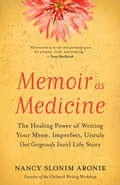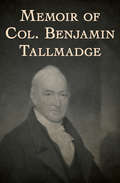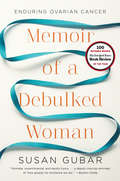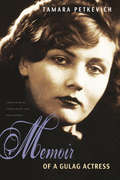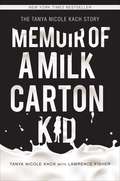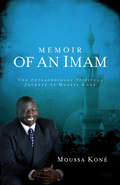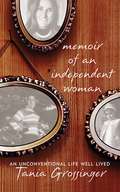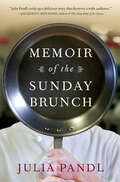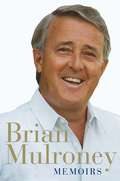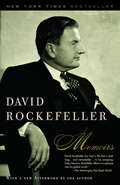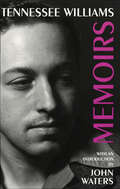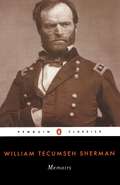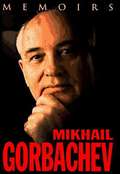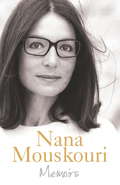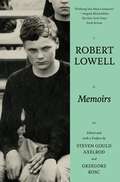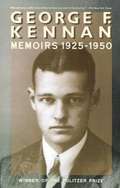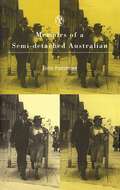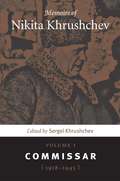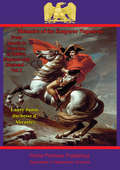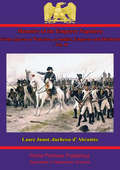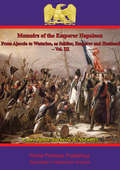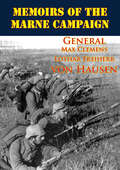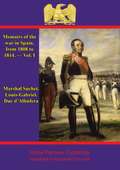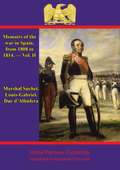- Table View
- List View
Memoir as Medicine: The Healing Power of Writing Your Messy, Imperfect, Unruly (but Gorgeously Yours) Life Story
by Nancy Slonim AronieA wonderfully fresh and frank guide to why and how to write personal stories that will heal, liberate, inspire — and entertain — both writer and reader Writing has been medicine for Nancy Slonim Aronie. At nine months old, her son Dan was diagnosed with diabetes. Then, at twenty-two, he was diagnosed with multiple sclerosis. During the years she and her husband took care of Dan, and when he died at age thirty-eight, Aronie could not find the book she needed. So she wrote her memoir. In teaching memoir writing, Aronie has found that everyone has a story to tell and that telling it is important. Sharing “this is who I am, these are the things that shaped me, this is where I am now” allows a kind of magic and healing to happen. Over decades of writing and teaching, Aronie has created a set of prompts, directions, and examples that she shares in Memoir as Medicine. She shows readers how to write through where they have been and into deep understanding, profound healing, and even unexpected joy.
Memoir of Col. Benjamin Tallmadge: Prepared By Himself, At The Request Of His Children (classic Reprint)
by Col. Benjamin TallmadgeThe Revolutionary War colonel—and leader of the famed Culper Spy Ring—tells his story in this fascinating historical autobiography. When British troops defeated the Continental Army on Long Island, General George Washington was forced to abandon New York in order to save the revolution. The British established their headquarters in New York City—beginning an occupation that would last the length of the war. Priceless intelligence flowed through the city&’s harbor, and Washington wanted to claim it as his own. To Benjamin Tallmadge, a young officer of the Continental Army, the general assigned an impossible mission: Infiltrate New York, establish a spy network, and report everything the British know. Throughout the war, Tallmadge and his spies collected intelligence on troop movements, sneak attacks, and the treachery of Benedict Arnold. Nearly two and a half centuries later, the heroic exploits of the Culper Spy Ring have served as the inspiration for the acclaimed TV series Turn: Washington&’s Spies and the video game Assassin&’s Creed III. In this lively and engaging memoir, the days of revolution are remembered by a patriot who fought in the shadows—and helped redefine the nature of espionage.This ebook has been professionally proofread to ensure accuracy and readability on all devices.
Memoir of a Debulked Woman: Enduring Ovarian Cancer
by Susan GubarA 2012 New York Times Book Review Notable Book "Staggering, searing...Ms. Gubar deserves the highest admiration for her bravery and honesty."--New York Times Diagnosed with ovarian cancer in 2008, Susan Gubar underwent radical debulking surgery, an attempt to excise the cancer by removing part or all of many organs in the lower abdomen. Her memoir mines the deepest levels of anguish and devotion as she struggles to come to terms with her body's betrayal and the frightful protocols of contemporary medicine. She finds solace in the abiding love of her husband, children, and friends while she searches for understanding in works of literature, visual art, and the testimonies of others who suffer with various forms of cancer. Ovarian cancer remains an incurable disease for most of those diagnosed, even those lucky enough to find caring and skilled physicians. Memoir of a Debulked Woman is both a polemic against the ineffectual and injurious medical responses to which thousands of women are subjected and a meditation on the gifts of companionship, art, and literature that sustain people in need.
Memoir of a Gulag Actress (NIU Series in Slavic, East European, and Eurasian Studies)
by Tamara PetkevichIn an abridged translation that retains the grace and passion of the original, Klots and Ufberg present the stunning memoir of a young woman who became an actress in the Gulag. Tamara Petkevich had a relatively privileged childhood in the beautiful, impoverished Petrograd of the Soviet regimeÆs early years, but when her father—a fervent believer in the Communist ideal—was arrested, 17-year- old Tamara was branded a \u201cdaughter of the enemy of the people.\u201d She kept up a search for her father while struggling to support her mother and two sisters, finish school, and enter university. Shortly before the Russian outbreak of World War II, Petkevich was forced to quit school and, against her better judgment, she married an exiled man whom she had met in the lines at the information bureau of the NKVD (PeopleÆs Commissariat of Internal Affairs). Her mother and one sister perished in the Nazi siege of Leningrad, and Petkevich was herself arrested. With cinematic detail, Petkevich relates her attempts to defend herself against absurd charges of having a connection to the Leningrad terrorist center, counter-revolutionary propaganda, and anti-Semitism that resulted in a sentence of seven yearsÆ hard labor in the Gulag.While Petkevich became a professional actress in her own right years after her release from the Gulag, she learned her craft on the stages of the camps scattered across the northern Komi Republic. The existence of prisoner theaters and troupes of political prisoners such as the one Petkevich joined is a little-known fact of Gulag life. PetkevichÆs depiction not only provides a unique firsthand account of this world-within-a-world but also testifies to the power of art to literally save lives. As Petkevich moves from one form of hardship to another she retains her desire to live and her ability to love.More than a firsthand record of atrocities committed in Stalinist Russia, Memoir of a Gulag Actress is an invaluable source of information on the daily life and culture of the Soviet Union at the time. Russian literature about the Gulag remains vastly under-represented in the United States, and PetkevichÆs unforgettable memoir will go a long way toward filling this gap. Supplemented with photographs from the authorÆs personal archive, PetkevichÆs story will be of great interest to general readers, while providing an important resource for historians, political scientists, and students of Russian culture and history.
Memoir of a Milk Carton Kid: The Tanya Nicole Kach Story
by Tanya Nicole Kach Lawrence FisherMemoir of a Milk Carton Kid is the haunting story of a girl, lost in the cracks of the system, forced to spend more than ten years as the prisoner of her school's security guard. From her troubled childhood, through her captivity at the hands of a manipulative captor, and ultimately on her road to recovery, Tanya's story is one of pain but ultimately triumph. Her story is told by her advocate and confidant, Lawrence Fisher. For more than five years his impassioned advocacy has helped Tanya as she has reintegrated into society. He successfully blends Tanya's story with his own insight into the legal issues surrounding the controversial case that followed Tanya's release. This multipronged approach gives the reader insight into Tanya's emotional state and the state of a criminal justice system that allowed her ordeal to happen.
Memoir of an Imam: The Extraordinary Spiritual Journey of Moussa Kone
by Moussa Kone“One day I asked my father, a respected Imam, a question: ‘If, this evening, you or I died, would we go to heaven?’ He replied: ‘Son, I don’t know, and we cannot know before our deeds, good and evil, are weighed on the scale of deeds.’ Thus stirred by an ardent desire for certitude for the fate of my soul, I threw myself into a thorough study of both the Koran and the Bible, the results of which I recount in this book.” Follow Moussa as he relates the turbulent and supernatural events that led to his meeting with Almighty God. His inspiring journey testifies to the extraordinary manner in which the Creator reveals Himself to each and every person who searches for Him sincerely and with all their heart.
Memoir of an Independent Woman: An Unconventional Life Well Lived
by Tania Grossinger“A tale of a young woman battling the stereotype of women living and working in the ‘swinging sixties’ and a road map of how she kept sane and successful in the real world of ‘mad men.’” —Sharon Hazard, WomanAroundTown.com It takes a special kind of woman to have the courage to defy societal conventions. In an era when her female counterparts were still expected to marry early and have children, Tania Grossinger set out on her own. After spending her childhood at the famous Grossinger’s resort in the Catskills, Tania Grossinger was the publicist for the groundbreaking The Feminine Mystique (over three million copies sold), spent seven years as the director of broadcast promotion for Playboy Magazine and the Playboy Club, did PR for The $64,000 Question, escaped her first marriage, and went to live in Mexico— and that’s only the beginning. Rubbing shoulders with some of America's most famous figures, what Tania has to reveal about Ayn Rand (she has a sense of humor after all), Timothy Leary, Hugh Hefner, and the unsolved disappearance of a fellow travel writer in Jamaica will keep you up at night turning the pages of one of the most interesting women to put pen to paper in recent memory. As she reflects on her life now, Tania is single and one of “two million of us Americans who are childless by choice.” The memoir is addressed to Natasha, on whose absence the book hinges. But who is she? Smart, sensitive, and revealing, this is a must-read memoir for any woman who has ever strived for independence.
Memoir of the Sunday Brunch
by Julia PandlA “delicious” account of a midwestern family’s restaurant business, and the bond between a daughter and her food-loving father (Jacquelyn Mitchard). At age twelve, Julie Pandl was initiated into the rite of the Sunday brunch, a weekly madhouse at Pandl’s, the family-owned Milwaukee-based restaurant where she and her eight older siblings did mandatory service—and where her father “traded his sanity for a paper chef hat and a set of utility tongs.” Amid the controlled chaos, they learned the ropes of the business and, more importantly, life lessons that would shape them in the years to come. In this wry, “heartfelt” memoir, Pandl looks back on those formative years, a time not just of growing up but, ultimately, of becoming a source of strength and support, as the world her father knew began to change into a tougher, less welcoming place (Booklist). Part coming-of-age story à la The Tender Bar, and part window into the mysteries of the restaurant business à la Kitchen Confidential, Memoir of the Sunday Brunch is filled with tender wisdom about the bonds between fathers and daughters, and about the simple pleasures that lie in the daily ritual of breaking bread.
Memoirs
by Brian MulroneyPolitics was always Brian Mulroney's real love. As an undergraduate in Nova Scotia he amazed his friends by getting Prime Minister Diefenbaker on the phone, and he rose fast in the Tory ranks in Quebec as a young Montreal lawyer. He tried for the leadership of the party in 1976, losing to Joe Clark, then returned to win a rematch in 1983. The next year, he ran the most successful election campaign in Canadian history, winning 211 seats, and taking office in September 1984. His first term in office was a stormy one, marked by the launch of the Meech Lake Accord and the Free Trade Agreement with the United States. In 1988, however, he was re-elected after a rollercoaster campaign, and his second term in office was just as controversial, featuring the Meech Lake and Charlottetown Accords -- still a source of bitter regret for him, as opportunities missed.This book falls into two main sections: first, his rise out of a working-class family in Baie-Comeau. Second, his immersion into the world of Ottawa politics, in opposition and then in power. The years in power are dealt with in fascinating detail, and we receive his candid accounts of backstage dealings with Trudeau, Clark, and other Canadian leaders and on the international scene with Reagan, Thatcher, Mitterrand, Kohl, Gorbachev, Mandela, Clinton, and many more. This big book has a huge cast of major players.Brian Mulroney is determined to make this the best prime minister's memoirs this country has ever seen, and a full-time researcher has been helping him for three years. This account of his career is colourful and forthright, and a number of opponents will be sorry that they caught his attention.The manuscript is full of personal touches and reflects the fact that he wrote it by hand, reading it aloud for rhythm and impact. Studded with entries from his private journal, this book -- by a son, brother, husband, and father -- is deeply personal, and includes some surprisingly frank admissions.The book establishes the scale of his achievements, and reveals him as a man of great charm. Memoirs will allow that little-known Brian Mulroney to engage directly with the reader. This book is full of surprises, as we fall under the spell of a great storyteller.From the Hardcover edition.
Memoirs
by David RockefellerBorn into one of the wealthiest families in America--he was the youngest son of Standard Oil scion John D. Rockefeller, Jr., and the celebrated patron of modern art Abby Aldrich Rockefeller--David Rockefeller has carried his birthright into a distinguished life of his own. His dealings with world leaders from Zhou Enlai and Mikhail Gorbachev to Anwar Sadat and Ariel Sharon, his service to every American president since Eisenhower, his remarkable world travels and personal dedication to his home city of New York--here, the first time a Rockefeller has told his own story, is an account of a truly rich life.
Memoirs
by John Waters Tennessee WilliamsFor the "old crocodile," as Williams called himself late in life, the past was always present, and so it is with his continual shifting and intermingling of times, places, and memories as he weaves this story. When Memoirs was first published in 1975, it created quite a bit of turbulence in the mediathough long self-identified as a gay man, Williams' candor about his love life, sexual encounters, and drug use was found shocking in and of itself, and such revelations by America's greatest living playwright were called "a raw display of private life" by The New York Times Book Review. As it turns out, thirty years later, Williams' look back at his life is not quite so scandalous as it once seemed; he recalls his childhood in Mississippi and St. Louis, his prolonged struggle as a "starving artist," the "overnight" success of The Glass Menagerie in 1945, the death of his long-time companion Frank Merlo in 1962, and his confinement to a psychiatric ward in 1969 and subsequent recovery from alcohol and drug addiction, all with the same directness, compassion, and insight that epitomize his plays. And, of course, Memoirs is filled with Williams' amazing friends from the worlds of stage, screen, and literature as heoften hilariously, sometimes fondly, sometimes notremembers them: Laurette Taylor, Gore Vidal, Truman Capote, Elia Kazan, Marlon Brando, Vivian Leigh, Carson McCullers, Anna Magnani, Greta Garbo, Elizabeth Taylor, and Tallulah Bankhead to name a few. And now film director John Waters, well acquainted with shocking the American public, has written an introduction that gives some perspective on the various reactions to Tennessee's Memoirs, while also paying tribute to a fellow artist who inspired many with his integrity and endurance.
Memoirs
by Michael Fellman William Tecumseh ShermanBefore his spectacular career as General of the Union forces, William Tecumseh Sherman experienced decades of failure and depression. Drifting between the Old South and new West, Sherman witnessed firsthand many of the critical events of early nineteenth-century America: the Mexican War, the gold rush, the banking panics, and the battles with the Plains Indians. It wasn't until his victory at Shiloh, in 1862, that Sherman assumed his legendary place in American history. After Shiloh, Sherman sacked Atlanta and proceeded to burn a trail of destruction that split the Confederacy and ended the war. His strategy forever changed the nature of warfare and earned him eternal infamy throughout the South. Sherman's Memoirs evoke the uncompromising and deeply complex general as well as the turbulent times that transformed America into a world power. This Penguin Classics edition includes a fascinating introduction and notes by Sherman biographer Michael Fellman.
Memoirs
by Mikhail GorbachevIn these long-awaited memoirs, Mikhail Gorbachev looks back on a lifetime that mirrors the fate of the Russian people. From the persecution of his family under Stalin to his first political steps, to his extraordinary rise within the Communist Party, Gorbachev recounts the events that led to his own disillusionment, without which the eventual implosion of communism would not have taken place. He casts an equally sharp eye on the policies of both past communist governments and present-day reformers.
Memoirs
by Nana MouskouriNana Mouskouri, the Greek singer and one of the world's most popular entertainers, tells her life story for the first time.For more than 40 years Nana Mouskouri has been a global singing sensation, from her earliest childhood memories of mid-Thirties Greece to her unstoppable rise to the summit of her profession. She tells of life as a child, experiencing the horrors of war and privation, victimised by bitter parental discord, stigmatised by her father's fatal addiction to gambling.She was a shy inhibited teenager with a passion for singing, a girl compelled to choose between her love of classical music and her fascination with popular song. As a highly successful adult, she has been racked by uncertainty and the torments of love, a woman struggling to balance music - her raison d'etre - with her role as wife and mother.Here she describes the life of the star we all know, from her beginnings in the nightclubs of Athens to her triumphs on the world's most glittering stages. Nana launches us into her international tours, taking us to Canada, the United States, Japan and Australasia as well as every country in Europe. She describes how she fought to win over audiences everywhere. In Britain, for example, she enjoyed dazzling success after her first English album Over and Over was released. In quick succession, twenty-three of her titles appeared in the charts. In Australia, she achieved fourteen gold discs in 1974 alone.Hers is a rich and astonishing life, studded with exceptional encounters and friendships: the incomparable trumpeter Quincy Jones, a musician Nana had secretely worshipped since childhood, introduced her to the United States and became her producer; Yvonne Littlewood, the BBC producer, made Nana a leading star of British television in the 1960s and remains one of her closest friends. Queen Elizabeth II, Bob Dylan, Frank Sinatra, and the Empress Farah Diba of Iran are among the galaxy of extraordinary figures who played a vital part in Nana's career. Intimate, rich in humanity and music, a spotlit global tour, Nana's book is an event.
Memoirs
by Robert LowellA complete collection of Robert Lowell’s autobiographical prose, from unpublished writings about his youth to reflections on the triumphs and confusions of his adult life.Robert Lowell's Memoirs is an unprecedented literary discovery: the manuscript of Lowell’s lyrical evocation of his childhood, which was written in the 1950s and has remained unpublished until now. Meticulously edited by Steven Gould Axelrod and Grzegorz Kosc, it serves as a precursor or companion to his groundbreaking book of poems Life Studies, which signaled a radically new prose-inflected direction in his work, and indeed in American poetry. Memoirs also includes intense depictions of Lowell’s mental illness and his determined efforts to recover. It concludes with Lowell’s reminiscences of other writers, among them T. S. Eliot, Robert Frost, Ezra Pound, John Berryman, Anne Sexton, Hannah Arendt, and Sylvia Plath. Memoirs demonstrates Lowell’s expansive gifts as a prose stylist and his powers of introspection and observation. It provides striking new evidence of the range and brilliance of Lowell’s achievement.Includes black-and-white photographs
Memoirs (1925-1950)
by George F. KennanThe American diplomat's reflections of his years of government service provide insight into four decades of U.S. policy<P><P> Winner of the National Book Award<P> Pulitzer Prize Winner
Memoirs Of A Semi-Detached Australian
by Passmore, JohnIn this vivid and iconoclastic memoir, John Passmore takes us on an unsentimental journey from his childhood in Manly, then half-village, half-resort-'seven miles from Sydney, a thousand miles from care'-to the hot-house environment of the University of Sydney, and on to the realities of his imagined Europe. These physical voyages were rites of passage. The first marked the end of the fierce parochialism of childhood, inducting him into university life at a time of intellectual and political controversy. The second saw the death of 'the little boy from Manly' and his replacement by a semi-detached Australian-not a rootless 'citizen of the world', but an Australian whose angle of vision had been permanently changed. In this challenging memoir, John Passmore mounts a passionate defence of the life of the mind, displaying the intellectual energy and insight that has made him a philosopher of international stature.
Memoirs Of Nikita Khrushchev: Volume 1 Commissar (1918-1945)
by Sergei Khrushchev George ShriverNikita Khrushchev’s proclamation from the floor of the United Nations that "we will bury you" is one of the most chilling and memorable moments in the history of the Cold War, but from the Cuban Missile Crisis to his criticism of the Soviet ruling structure late in his career the motivation for Khrushchev’s actions wasn’t always clear. Many Americans regarded him as a monster, while in the USSR he was viewed at various times as either hero or traitor. But what was he really like, and what did he really think? Readers of Khrushchev’s memoirs will now be able to answer these questions for themselves (and will discover that what Khrushchev really said at the UN was "we will bury colonialism"). This is the first volume of three in the only complete and fully reliable version of the memoirs available in English. In this volume, Khrushchev recounts how he became politically active as a young worker in Ukraine, how he climbed the ladder of power under Stalin to occupy leading positions in Ukraine and then Moscow, and how as a military commissar he experienced the war against the Nazi invaders. He vividly portrays life in Stalin's inner circle and among the generals who commanded the Soviet armies. Khrushchev’s sincere reflections upon his own thoughts and feelings add to the value of this unique personal and historical document. Included among the Appendixes is Sergei Khrushchev’s account of how the memoirs were created and smuggled abroad during his father’s retirement.
Memoirs Of The Emperor Napoleon – From Ajaccio To Waterloo, As Soldier, Emperor And Husband – Vol. I (Memoirs Of The Emperor Napoleon – From Ajaccio To Waterloo, As Soldier, Emperor And Husband #1)
by Anon Laure Junot duchesse d’Abrantès S. M. HamiltonLaure Junot, Duchesse d'Abrantes stands as one of the most influential figures in shaping the Napoleonic era: she was no statesman, military or civil leader, but she was a hugely well connected member of the court of Napoleon, and an inveterate gossip. An old family friend of the Bonaparte's from Corsica, she was married to one of Napoleon's oldest friends Andoche Junot, thus moving in the highest circles in Paris, known by and knowing everyone of note. Originally written at huge length (some editions run to more than 12 volumes), this English edition provides the highlights of her witty, irreverent, yet highly informative memoirs of the reign of Napoleon.
Memoirs Of The Emperor Napoleon – From Ajaccio To Waterloo, As Soldier, Emperor And Husband – Vol. II (Memoirs Of The Emperor Napoleon – From Ajaccio To Waterloo, As Soldier, Emperor And Husband #2)
by Anon Laure Junot duchesse d’Abrantès S. M. HamiltonLaure Junot, Duchesse d'Abrantes stands as one of the most influential figures in shaping the Napoleonic era: she was no statesman, military or civil leader, but she was a hugely well connected member of the court of Napoleon, and an inveterate gossip. An old family friend of the Bonaparte's from Corsica, she was married to one of Napoleon's oldest friends Andoche Junot, thus moving in the highest circles in Paris, known by and knowing everyone of note. Originally written at huge length (some editions run to more than 12 volumes), this English edition provides the highlights of her witty, irreverent, yet highly informative memoirs of the reign of Napoleon.
Memoirs Of The Emperor Napoleon – From Ajaccio To Waterloo, As Soldier, Emperor And Husband – Vol. III (Memoirs Of The Emperor Napoleon – From Ajaccio To Waterloo, As Soldier, Emperor And Husband #3)
by Anon Laure Junot duchesse d’Abrantès S. M. HamiltonLaure Junot, Duchesse d'Abrantes stands as one of the most influential figures in shaping the Napoleonic era: she was no statesman, military or civil leader, but she was a hugely well connected member of the court of Napoleon, and an inveterate gossip. An old family friend of the Bonaparte's from Corsica, she was married to one of Napoleon's oldest friends Andoche Junot, thus moving in the highest circles in Paris, known by and knowing everyone of note. Originally written at huge length (some editions run to more than 12 volumes), this English edition provides the highlights of her witty, irreverent, yet highly informative memoirs of the reign of Napoleon.
Memoirs Of The Marne Campaign
by General Max Clemens Lothar Freiherr von HausenGeneral Baron von Hausen, after a long and successful career in the Royal Saxon Army, was charged with the most important command of his career as the head of the German Third Army in 1914. The army participated in the Battle of the Frontiers, mainly in the battles of Dinant and Charleroi gained infamy for their responsibility for the destruction of Reims in September 1914. After the Second Army's was forced back after the First Battle of the Marne, Von Hausen saw his own flank exposed and ordered a retreat. Upon the stabilization of the front on the river Aisne, Von Hausen was made a scapegoat for the failure of the Schlieffen Plan and relieved of his command and replaced by General Karl von Einem. Affronted by the stain on his and his Saxon comrades, von Hausen considered it his duty to write his personal testimony concerning the Third Army under his command. Kircheisen comments that "According to the most authoritative sources, the Battle of the Marne can not be considered as a strategic defeat for the Germans. It should be regarded rather as a battle lost by us on account of tactical reasons".
Memoirs Of The War In Spain, From 1808 To 1814. — Vol. I (Memoirs Of The War In Spain, From 1808 To 1814 #1)
by Anon. Marshal Louis-Gabriel Suchet, Duc d'Albufera"If I had had two Marshals like Suchet I should not only have conquered Spain, but have kept it." This was the measured and just opinion of Marshal Suchet. Out of the graveyard for reputation that Spain became for the French generals, Marshal Suchet's ability, aplomb and shrewdness gained him the unique distinction of being awarded his marshal's dignity to his services in Spain.In his memoirs of the War in Spain, he recounts his experiences with honesty, balance and verve. His exciting battle narratives are interspersed with his expert appreciations of the situation as the Peninsular slipped from French grasp and the often acrimonious relations between the French commanders. With the fanatical resistance of the Spanish people, a lack of co-ordination, few supplies and growing British pressure, the achievement of Suchet under such circumstances is truly brilliant. A humble and moderate man, Suchet wrote his memoirs as he commanded in the field, with dash, brilliance, balance and poise.A fine addition to the library of anyone interested in the Peninsular War.Author --Marshal Suchet, Louis-Gabriel, Duc d'Albufera, 1770-1826Translator -- Anon.Text taken, whole and complete, from the edition published in London: H. Colburn, 1829.Original Page Count - lvi and 344 pages.
Memoirs Of The War In Spain, From 1808 To 1814. — Vol. II (Memoirs Of The War In Spain, From 1808 To 1814 #2)
by Anon. Marshal Louis-Gabriel Suchet, Duc d'Albufera"If I had had two Marshals like Suchet I should not only have conquered Spain, but have kept it." This was the measured and just opinion of Marshal Suchet. Out of the graveyard for reputation that Spain became for the French generals, Marshal Suchet's ability, aplomb and shrewdness gained him the unique distinction of being awarded his marshal's dignity to his services in Spain.In his memoirs of the War in Spain, he recounts his experiences with honesty, balance and verve. His exciting battle narratives are interspersed with his expert appreciations of the situation as the Peninsular slipped from French grasp and the often acrimonious relations between the French commanders. With the fanatical resistance of the Spanish people, a lack of co-ordination, few supplies and growing British pressure, the achievement of Suchet under such circumstances is truly brilliant. A humble and moderate man, Suchet wrote his memoirs as he commanded in the field, with dash, brilliance, balance and poise.A fine addition to the library of anyone interested in the Peninsular War.Author --Marshal Suchet, Louis-Gabriel, Duc d'Albufera, 1770-1826Translator -- Anon.Text taken, whole and complete, from the edition published in London: H. Colburn, 1829.Original Page Count - 499 pages.
